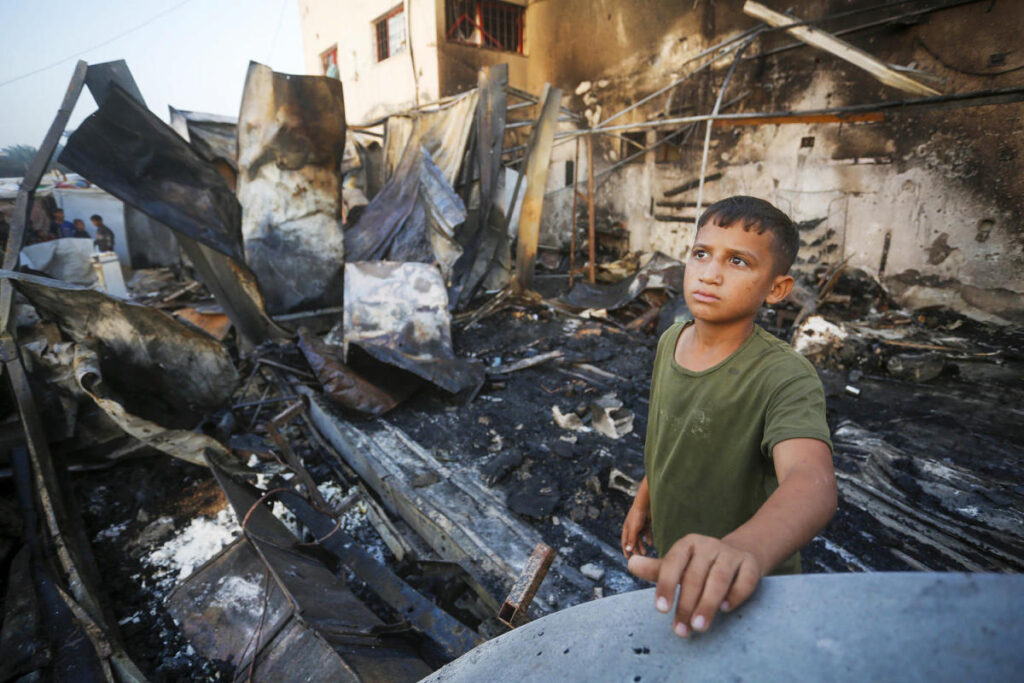In recent days, the Israeli military has intensified its operations in the Gaza Strip, executing a series of airstrikes that have raised alarms over civilian casualties and humanitarian concerns. Notably, strikes targeted several significant locations, including a flour distribution center, a school, and a hospital, all of which housed displaced Palestinians seeking refuge from the ongoing violence. The Al-Aqsa Martyrs Hospital in Deir al-Balah was particularly affected, as an airstrike led to devastating scenes captured on video, highlighting the human toll of these military actions. Reports indicate at least four fatalities and numerous injuries, including among women and children. The strikes have prompted widespread condemnation, with observers pointing to the grave implications of targeting vital civilian infrastructure in a densely populated area.
The Israeli Defense Forces (IDF) have justified their actions by stating they are aimed at Hamas militants, who they claim are utilizing civilian locations, including hospitals, for their operations. However, these assertions have been met with skepticism, including from international bodies like the United Nations. A recent fact-finding mission established by the UN Human Rights Council labeled the Israeli military’s attacks on medical facilities as potential war crimes, specifically citing “willful killing and mistreatment,” as well as a crime against humanity. Despite the overwhelming evidence and testimonies documenting the destruction and loss of life, Israel’s Foreign Affairs Ministry has dismissed the UN’s findings as “outrageous,” illustrating the contentious nature of the conflict and the significant divide in narratives between the involved parties.
Amidst the escalating violence, the impact on civilian populations has become increasingly dire. In addition to the airstrikes on the hospital, the IDF struck a UN-run school in Nuseirat, resulting in the deaths of at least 20 people. UNRWA Commissioner-General Philippe Lazzarini condemned the attack, which not only claimed lives but also disrupted critical public health initiatives, particularly a polio vaccination campaign that was scheduled to occur at the school. The strikes have not only exacerbated the humanitarian crisis in Gaza, where thousands are already displaced and in need of assistance, but they also highlight the challenges faced by humanitarian organizations striving to provide aid amidst such hostilities.
The relentless military operations have led to a serious escalation of violence over the weekend, continuing into the early hours of Monday. Reports of additional airstrikes, including one on the Jabalia refugee camp, further underscore the gravity of the situation, claiming further lives and injuring dozens. The breadth of these strikes reflects a systematic approach by Israeli forces to dismantle Hamas operations, yet the indiscriminate nature of the bombings raises profound ethical questions about warfare and the protection of non-combatants. Local health officials cite over 42,200 deaths in Gaza since the commencement of Israeli military actions following the October 7 attacks by Hamas, which resulted in significant casualties in Israel, including 1,200 fatalities and numerous hostages.
The broader geopolitical landscape continues to be affected by these regional conflicts, especially with rising tensions and military actions observed in Lebanon. As violence escalates, humanitarian officials have implored the international community to intervene and prevent what could become a grim new standard for violence in the region. Lazzarini has voiced the urgent need for humanity to prevail, advocating for decisive action to address the crisis and ensure that the suffering of civilians does not continue without international attention or intervention. The ongoing massacres and their implications for civilians further underline the urgent need for dialogue and resolution in a conflict that has long stirred deep-rooted animosities and grievances.
Ultimately, the continuous cycle of violence and retaliatory strikes threatens the prospects of peace and stability in the region. With casualties mounting and humanitarian conditions deteriorating, the situation requires immediate and comprehensive international scrutiny. The complexities of military engagements in densely populated areas, such as Gaza, necessitate serious consideration of civilian protections and adherence to international humanitarian laws. Without serious efforts toward ceasefire negotiations and substantive discourse among all parties involved, the cycle of violence is likely to persist, with devastating consequences for innocent lives caught in the crossfire.

